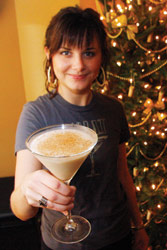Nog is still considered the quintessential Christmas quaff, but the egg causes many would-be drinkers to shirk the concoction.

The egg was once an essential element of the barkeep’s arsenal, used to add body and fizz to drinks. The practice dates back to the 17th century, when British subjects starting whipping eggs into their punchbowls: The men who signed the Declaration of Independence were likely accustomed to eggs in their rum, wine and beer. While cocktail revivalists are again stocking their bars with cartons of eggs, most drinkers (i.e. those living beyond the classic cocktail confines of New York City) seem content to leave raw-egg consumption to conjurers and prizefighters.
“I don’t think there’s a lot of demand for it,” says Joel Hartzler, owner of Rankin Vault Cocktail Lounge in downtown Asheville. “I think the health and safety thing is a problem for people.”
The health and safety thing is, specifically, salmonella, the potentially deadly bacteria that’s been linked with raw meat, milk and eggs. Egg cocktail boosters claim the risk has been overblown, citing USDA statistics showing only one egg per every 20,000 is contaminated. Even drinkers unlucky enough to slurp up bacteria with their booze are unlikely to succumb to it, they say: Raw eggs pose the greatest danger to children and pregnant women, who probably shouldn’t be imbibing anyhow.
“Check your eggs for freshness,” advises LeNell Smothers, a New York City boutique liquor-store owner, who led a packed-to-capacity session entitled “Cracking the Egg” this summer at Tales of the Cocktail, the annual gathering of bar pros and drink geeks. Smothers suggests, if you are one of those who chooses to go against USDA advice, placing a cocktail-destined egg in water:
“If it sinks to the bottom and lies on its side, it is very fresh—one for a raw egg drink,” Smothers wrote in Backyard Poultry. “After the egg is about 10 days old, the egg will stand on end in water. Don’t use this in a cocktail. Bake a cake with it instead. If the egg floats to the surface, it’s best in the trash.”
The trouble with eggs doesn’t end there. Assuming a bar has fresh eggs (and customers who want them), it’s still countless shakes away from serving a decent drink. Robert Heugel, a Houston mixologist and blogger, last year wrote a 4,700-word manifesto on egg cocktails with the proviso: “Egg cocktails require a ton of shaking. Seriously, you can’t imagine how long it feels until you try and make that perfect Ramos Gin Fizz. You have to shake these guys forever.”
According to cocktail historian David Wondrich, the Imperial Cabinet Saloon—which pioneered the Ramos Gin Fizz—in 1900 employed one so-called “shaker boy” for each bartender: “a young black man whose sole job was to receive the fully charged shaker from the bartender and shake the bejeezus out of it.”
Today’s bartenders who persist in serving fizzes and flips, perhaps besotted by the foamy richness the egg imparts, are also stuck with finding a refrigerated spot behind their bars for something as fragile as eggs.
“There’s a whole hassle with keeping eggs, as opposed to normal ingredients that you can just pour out of the bottle,” says Hartzler.
But Hartzler says his reticence regarding raw eggs hasn’t inhibited his liquid cheer this holiday season. Rankin Vault is currently offering an eggnog martini, a pretty thing sprinkled with nutmeg. The concoction contains vodka, amaretto and eggnog—“but we don’t crack an egg for that,” Hartzler says. The starring nog is the pasteurized variety found on supermarket shelves.
“We came up with it at a Christmas party,” Hartzler says. “My wife wanted some kind of martini, so we were shaking all sorts of funny things with eggnog. This one is super-good.”
Justin Crawford, who devised the impressively purist cocktail menu at Scratch, isn’t toying with nogs for Christmas, but has added a yuletide drink to the bar’s specials list. The recipe calls for black tea-infused rum, cinnamon-bark shavings, sweet vermouth, ground cardamom and “egg white for body,” Crawford says.
“Before there was seltzer water, before there was carbonation, that’s what was used to give body to a drink,” Crawford explains.
A super-creamy Ramos Gin Fizz is among eight classic cocktails featured on the bar menu at Scratch, perhaps the only Asheville restaurant currently advertising its willingness to shake raw eggs into its drinks. While bartenders around town will add egg whites to cocktails upon request—an especially easy task if they have ready access to a restaurant kitchen, as many of Asheville’s best bartenders do—Scratch is apparently the only local watering hole where raw eggs are a menu fixture.
“People shy away from it, but people shy away from a lot of things that are really good,” says Crawford, the restaurant’s general manager.
Egg cocktail fans theorize the reluctance of some customers to sample drinks hopped up on eggs is rooted in their misunderstanding of a beaten egg’s taste. Asked to imagine an egg in a drink, neophytes often imagine an omelet tucked into their Manhattan, or a scrambled egg floating in their gin. Yecch.
But eggs play much the same role in alcoholic drinks as alcohol does in food: Rather than leaving a distinctive flavor footprint, the egg instead subtly alters the cocktail’s gestalt. It’s a matter of some fairly sophisticated chemistry involving protein bonding, which is the last thing most bar patrons want to discuss.
“It does take a little bit of coaxing,” Crawford concedes. “But when people try it, they really enjoy it.”



If you use eggs that have been pasteurized in the shell, you don’t have to worry. They can stay at room temperature for 8 hours too, so you can keep them behind the bar. (Davidson’s is one example. I use them at my bar.)
And the idea that a fresh egg is a safe egg is false. Any egg can contain salmonella — caged hen, free range hen, organic feed, etc. — unless it’s pasteurized.